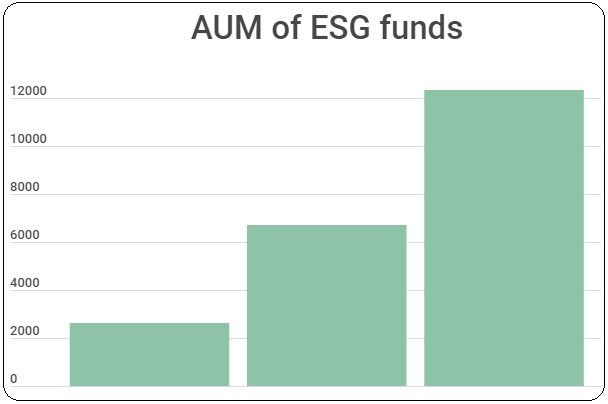ESG and passive are no longer investment tools of a select few. Reports show that both the products are gaining mass acceptance at a fast pace in India.
Data shows that passive AUM now accounts for over 10% of the total industry assets as compared to 6.5% two years ago. In the previous financial year alone (FY 2020-2021), passive AUM almost doubled to Rs. 3 lakh crore from Rs. 1.57 lakh crore. The momentum has continued this financial year as the AUM has surged 42% till November 2021.
A similar trend is being seen in ESG funds although at a much smaller base. According to a recent report by Motilal Oswal Financial Services, the AUM of ESG funds touched Rs.12,320 crore in November 2021 after growing 4.7 times over a two-year period.

*in crore | Source: Motilal Oswal Financial Services
According to the report, there are now 10 ESG funds in India and seven out of them were launched in and after January 2020.
However, ESG funds still have a lot of catching up to do. These funds comprise just 0.3% of the total MF AUM in India as compared to 25-60% in developed countries, the report showed.
'The future is brighter'
A recent report by Finity expects the passive AUM to account for 37% of industry AUM by 2025. At present, the figure stands at 10%.
“We estimate that passive assets will cross Rs 25 trillion of AUM by 2025 from an AUM of Rs 3 trillion in March 2021, which is a growth of more than 8X. We also estimate that passive assets will grow to constitute 37% of the overall assets in the mutual fund industry by 2025 from the 10% as of March 2021," the report said.
The report said the growth is being driven by three factors — underperformance of active funds, lower expense ratio of passive funds and regulatory and government policies like the one that mandates EPFO to invest in ETFs.
Are ESG funds expected to hit a similar growth trajectory in years to come?
Though there's no growth prediction available in case of ESG funds, the present focus on sustainable living is likely to bring higher inflows for ESG funds in the future.
"Recently with India committing to a 2070 deadline to achieve net-zero emissions, the progress towards sustainability should gather pace in the coming years," Motilal Oswal Financial Services stated in the report.







